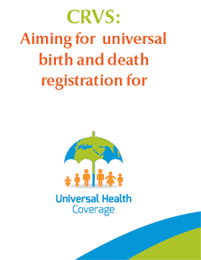In most countries, a civil registration system is used to record statistics on vital events, such as births, deaths, marriages, divorces and fetal deaths. This government administrative system creates a permanent record of each event. A well-functioning CRVS system aims to:
- secure individuals with recognition of their legal identity and ensure rights of access to public services, social protection and human rights;
- generate statistics on population dynamics and health indicators on a continuous basis for the country as a whole and at a local level for its administrative subdivisions;
- generate essential statistical information that decision-makers depend on for policy formulation, planning and implementation, and monitoring, and
- permit the understanding of the prevalence, distribution and causes of mortality, as well as identify health inequalities and priorities.
Civil registration is defined by the UN as:
… “the continuous, permanent, compulsory, and universal recording of the occurrence and characteristics of vital events (live births, deaths, fetal deaths, marriages, and divorces) and other civil status events pertaining to the population as provided by decree, law or regulation, in accordance with the legal requirements in each country.”1
Development and strengthening of CRVS systems are important for improving the quality of a country’s vital statistics, and for using this information to guide policies and programmes. This broader concept has been captured in the UN definition of a vital statistics system as:
… the total process of: 1) collecting information by civil registration or enumeration on the frequency or occurrence of specified and defined vital events, as well as relevant characteristics of the events themselves and the person or persons concerned; and 2) compiling, processing, analyzing, evaluating, presenting and disseminating these data in statistical form.






 Carla Abou Zahr: Why CRVS matters?
Carla Abou Zahr: Why CRVS matters? Carla Abou Zahr: CRVS journey
Carla Abou Zahr: CRVS journey